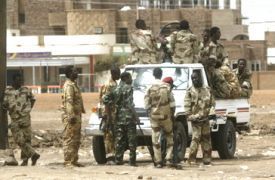Sudanese police raid human rights groups’ meeting
Jan 22, 2006 (KHARTOUM) — Sudanese police raided a human rights groups’ meeting Sunday, briefly detaining participants and seizing documents and laptops, delegates said — on the eve of an African leaders’ summit in the country the United States accuses of genocide.

|
|
Sudanese soldiers on foot and in a pick-up are on patrol in the street of Khartoum (file/photo) . |
National and international human rights groups had organized the meeting on the sidelines of the African Union summit. By tradition, Sudan’s President Omar El-Bashir should named the next chairman of the 53-nation bloc during the two-day summit, which begins Monday in the Sudanese capital.
More than 50 African human rights and civil groups wrote African leaders on Jan. 16 to express concern at the prospect of Sudan leading the AU when it stands accused of fueling a conflict in its Western Darfur region that the United Nations has called the world’s worst humanitarian crisis.
Among those detained were five European diplomats, correspondents for Reuters and for Radio-France Internationale and two members of a Zimbabwean non-governmental organisation.
Plainclothes police officers stormed into the private building where the human rights meeting was taking place, searched participants and tried to take their mobile phones, British and Sudanese delegates said, speaking by phone to The Associated Press during the confrontation.
Police photographed and videotaped about 30 people attending the meeting, and refused to allow them to leave the building, the British delegate said, on condition of anonymity for fear of recrimination. Police told them the meeting was not authorized, participants said.
Police released everyone after three hours, returning laptops and most of their documents.
“This kind of heavy-handed behavior shows why Sudan was not the right country to hold the summit and also shows the president of Sudan isn’t the correct person to lead the African Union,” Human Rights Watch spokesman Reed Brody said.
Sudanese authorities said they could not immediately comment on the raid.
Military coup leader Omar el-Bashir, is accused of complicity in the Darfur conflict that has killed an estimated 180,000 people and displaced about 2 million others since 2003. On Sunday, in an interview with the official Sudan News Agency, he accused Washington of trying to block Sudan from assuming the AU chairmanship.
At a foreign ministers’ meeting on Sunday, several countries challenged the AU Human Rights Commission’s report, which was to be published at the summit, Djibouti’s Foreign Minister Mohammed Ali Youssouf said.
It “caused much controversy among many countries which have violated human rights,” and was being sent back to the commission after complaints that those accused had no chance to defend themselves, Youssouf said. He did not identify the countries that protested.
A 7,000-strong AU force is in Darfur charged with monitoring an April 2004 cease-fire between El-Bashir’s government and rebels that is being regularly broken by all parties. El-Bashir’s government denies that it arms and supports militias which also attack peacekeepers.
Rebels said on Sunday that they would boycott ongoing peace talks to protest the prospect of the Sudanese government assuming the AU chairmanship and becoming both a mediator and a participant in the talks.
Humanitarian workers say killings and rapes continue in Darfur. Former U.S. Secretary of State Colin Powell accused el-Bashir’s government of genocide, but the U.S. has not acted on threats to impose sanctions against Sudan, which is rich in oil.
Despite the dilemma, East African states support Sudan’s bid to lead the African Union, Djibouti’s minister said. So does Egypt, which wields influence over North African states.
Privately, several West African states have expressed opposition, and support for Congo to get the chair. But Sudan appeared in a strong position with no other contender declaring its interest in the job.
Only Chad has come out openly in opposition, since the violence in Darfur spilled over the border and President Idriss Deby accused Sudan of backing rebels seeking to overthrow his government. Sudan denies the charge and has called for talks.
In the south, Zimbabwe, facing criticism of its own human rights record, is expected to support Sudan.
(AP/ST)
